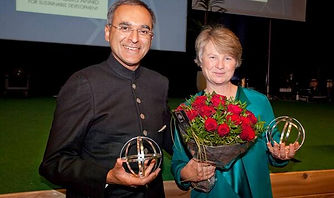News


Investing in the Ecosystem...
September 2017
This article by Mr. Rana Kapoor, YES Bank CEO, (in The Hindu, Chennai, 4th September) is consistent with GIST's vision and mission, as it stresses the need for a comprehensive evaluation system for national and corporate performance that accounts for undesirable side-effects of economic activity by recognising and measuring impacts and dependencies on natural capital. It is encouraging that concern for measuring progress holistically, by including natural capital externalities, is gaining ground among businesses, governments, and the media. Link to the article.
February 2017
Sanjeev Sanyal, Advisor GIST, has been appointed as Principal Economic Adviser in the Department of Economic Affairs, Government of India on 3rd February 2017.
Sanjeev Sanyal was the Chief economist and Director of Global Markets Research at Deutsche Bank in Singapore. He was the founding Director of the “Green Accounting for Indian States Project” (GAISP), launched in 2004 as GIST’s first project. Read more.
Pavan Sukhdev study leader of TEEB at the TEEBAgFood interim report launch
December 2015
Interim results are presented from five exploratory sector studies (on livestock, rice, agroforestry, inland fisheries and palm oil), while the development of a ‘valuation framework’ provides a common lens for ensuring that the full range of impacts and dependencies can be examined under different applications (i.e. by sector, system or practice). The report examines the way forward for this study by identifying economic and policy drivers and incentives that influence land-use decisions and management techniques within production systems around the world. Click to read the report.
GIST concludes 'Media Master Class on Climate Change and Sustainability'
March 2016
Green Indian States Trust conducted a Media Master Class (MMC) aimed at encouraging and educating environmental reporters and journalists in India to effectively report on issues related to climate change and sustainability.
The sessions were structured around presentations by engaging thought leaders in the field and included case study based activities, informative videos as well as interactive sessions to discuss new approaches for holistic reporting. Read more.
Pavan Sukhdev wins the prestigious 2015 Blue Planet Prize
November 2016
The Blue Planet Prize, established by the Asahi Glass Foundation is an award presented to individuals or organizations worldwide in recognition of major contributions to solving global environmental problems.
Pavan Sukhdev was awarded the Blue Planet Prize for his contribution towards developing economic rationale and practical metrics for transition towards an inclusive green economy. His work has helped mainstream the values of ecosystem services into improved public policies and business practices. Read more.
Pavan Sukhdev wins the 2015 environmental award KfW-Bernhard-Grzimek-Preis
April 2015
Pavan Sukhdev received the 2015 KfW-Bernhard-Grzimek-Preis for his leading contribution to the study “The Economics of Ecosystems and Biodiversity“ (TEEB). KfW Stiftung aims to heighten public awareness on biodiversity, and to raise the attention of leaders in politics, economics, science and civil society to the fundamental importance of fast and sustainable action to ensure a future for all. TEEB offers a ground-breaking approach to evaluate biodiversity and allows the increasing costs resulting from the loss of biodiversity to be determined. Read more.
Pavan Sukhdev presented the Gothenburg Award for Sustainable Development
May 2013
Pavan Sukhdev received the prestigious Gothenburg Award for Sustainable Development along with Janine Benyus for the year 2013. He received the award in recognition for his role as the study leader of 'The Economics of Ecosystems and Biodiversity' (TEEB), which is a global initiative focused on drawing attention to the economic benefits that ecosystems provide and for bringing focus to nature's services and ingenious solutions on which human survival and well being is dependent. To read more click here.
Pavan Sukhdev receives the BNHS 'Salim Ali International Award' for Nature Conservation
October 2012
Bombay Natural History Society presented its most coveted award, the 'Salim Ali International Award' for Nature Conservation to Pavan Sukhdev. He was presented with this award in recognition of his efforts to bridge the gap between economics and ecology. In order to remove the gap between nature and economy, Pavan Sukhdev has advocated change in the way corporates, governments and the society function. As the study leader of 'The Economics of Ecosystem and Biodiversity,' he helped draw attention to the economic benefits that ecosystems provide to the economy, encouraging policy makers to include these values while making developmental choices. His role as a speaker at the World Economic Forum in Davos and his presence on the boards of Conservation International and Stockholm Resilience Centre furthers this cause. Read more.
Sanjeev Sanyal awarded Eisenhower Fellowship
June 2007
To read more on his views about 'Sustainable Urban Environments' click here.
CEC uses GAISP methodology and values
December 2006
The 'Central Empowered Committee' in its report (IA NO. 826 In IA NO. 566) regarding calculation of net present value (NPV) payable on use of forest land of different types for non-forest purposes, calculated the average NPV per hectare of forests in India based on the methods and values provided by the GIST monographs.
To find the average net present value per hectare of forests in India, the monetary value of several goods and services such as carbon sequestration, value of flagship species, timber and non-timber forest product were taken from the monographs. The CEC also agreed to use 4% social discount rate for the calculation of NPV of per hectare value of India's forest, based on the GIST monographs. Read more.










